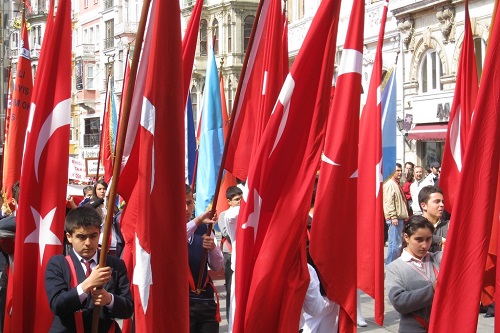JEFU photo
By
Tom Arms
They call it “Managed Democracy.” Another term is an “illiberal state.”
It is a political/philosophical term that has emerged from central and Eastern Europe to describe political systems whose leaders claim democratic credentials while suppressing dissent.
Degrees of managed democracy have become the order of the day in Russia, Turkey, Hungary, Romania, the Czech Republic, Bulgaria and Slovakia. It is also finding adherents elsewhere in the democratic world where politicians and their supporters are frustrated by the slow-turning wheels of traditional representative government.
At the heart of this new system are free and fair elections—and they are scrupulously so. Election observers are invited to scrutinise every poll. Ballot papers are carefully printed, distributed and counted. The result is announced and – the winner takes all.
From the moment that a new government is elected, the “managed“ element takes over with a vengeance. Government appointed judges pack the courts along with the top positions in the military and police. Senior positions in the universities change hands. Opposition media is either barred from press conferences, terrorized, de-licensed, denied advertising revenue or its senior figures are thrown into prison on trumped up charges.
The political opposition is marginalised and when elections come around again the government is guaranteed pole position because of its stranglehold on the levers of power. Over a few elections the word democracy is dropped from the political vocabulary and voters are left with a state which is “managed” for a shrinking group of corrupt special interests.
All the above is nowadays used to describe an “illiberal democracy”, which is why men such as Hungarian Prime Minister Viktor Orban, Russian President Vladimir Putin and Turkey’s Recep Tayyip Erdogan proudly refer to their regimes as “illiberal.”
In contrast, the traditional democratic state has elections plus an independent judiciary, free press, active elected opposition, and an apolitical military and police force; all underwritten by a rule of law based on precedent and a respect for every citizen’s rights whether they come from the majority or minority political pool.
The EU is meant to be a brake on “illiberal” leanings by its members. It is a democratic club with rules spelled out at a 1993 Copenhagen Summit which declared: “Membership requires that a candidate country has achieved stability of institutions guaranteeing democracy, the rule of law, human rights, (and) respect for and protection of minorities…”
The obvious disconnect between the current Turkish government and the Copenhagen Agreement has shifted Turkish EU membership to the indefinite backburner. It has also prompted Members of the European Parliament to call for the suspension of voting rights and EU funds for Poland, Hungary and the Czech Republic. This is allowed under Article 7 of the EU Treaty of Accession which says member states must abide with the Copenhagen rules before and after accession.
The problem is that everyone knows that Article 7 is a “nuclear option” which no one wants to launch for fear that it could spark a destabilising British style exit by East Europeans.
When the East European countries were pulled into the EU orbit there was no long history of representative government. On the contrary, they had been Soviet satellites for nearly half a century. Before that they were under the Nazi heel or part of the autocratic Russian, Ottoman or Austro-Hungarian empires. Democratic governments were few and short-lived.
The main purpose in pulling East Europeans under the EU umbrella was to nurture the green shots of post-Cold War democracy and push back Russian influence. Now it is the East Europeans who are trampling on the green shoots and threatening to march their “illiberalism” westward.
Tom Arms is the editor of LookAheadnews.com. Sign up now for the weekly diary of world news events.
LookAhead Radio World Report for week commencing 30 October 2017:
Tom Arms
I am a journalist, entrepreneur and historian with extensive experience in print, web and broadcast journalism. I started as a diplomatic correspondent, wrote several books (The Falklands Crisis, World Elections On File and the Encyclopedia of the Cold War), and then in 1987 started my own business (Future Events News Service, www.fensinformation.com) which over 25 years established itself as the world and UK media’s diary. Our strapline was: “We set the world’s news agenda.” I sold FENS in December 2012 but retained the exclusive broadcast rights to all of FENS data. To exploit these rights I set up LookAhead TV which produces unique programmes which “Broadcasts Tomorrow Today” so that viewers can “Plan to Participate.” LookAhead has appeared regularly on Vox Africa, Radio Tatras International, The Conversation and Voice of Africa Radio.
In addition to being a syndicated broadcaster and columnist on global affairs, Tom is also available for speaking engagements and can be contacted on Twitter, Linkedin and email: [email protected].



No Comments Yet!
You can be first to comment this post!